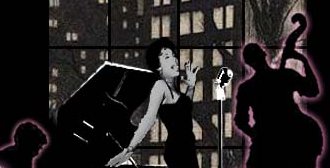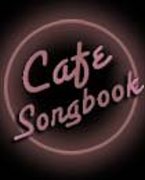Welcome toCafe SongbookInternet Home of the |
 |
 |
| Home || Songs || Songwriters || Performers || Articles and Blogs || Glossary || About Cafe Songbook || Contact/Submit Comment | |
| Search Tips: 1) Click "Find on This Page" button to activate page search box. 2) When searching for a name (e.g. a songwriter), enter last name only. 3) When searching for a song title on the catalog page, omit an initial "The" or "A". 4) more search tips. | |
William Engvick |
||
|
Basic InformationBorn: July 1, 1914, Oakland, California Primary songwriting role: lyricist; also composer and pianist Co-writers: chiefly Alec Wilder. Also view a database of nine William Engvick co-writers. |
|
Overview and Commentary |
|||
|
William Engvick (born July 1914) is an American lyricist, many of whose compositions appear in films. Engvick graduated as an art major from the University of California, Berkeley in 1937. He is best known for his collaborations with composer Alec Wilder, a partnership that began shortly after he came to New York from California in 1939 and continued for some forty years. Together they produced songs for the Broadway musical Once Over Lightly (1942), and for the musical television special Pinocchio (1957) as well as the standards "While We're Young" and Crazy in the Heart." Engvick and Wilder also created the book Lullabies and Night Songs in which poems by poets such as Lewis Carroll, William Blake, James Thurber, Robert Lewis Stevenson and others are set to the music of Wilder with illustrations by Maurice Sendak. (Shawn Colvin, inspired by the book, recorded the album Holiday Songs And Lullabies that includes many of the songs from the Wilder, Sendak, Engvick book.) Engvick was also responsible for a number of English language lyrics to songs originally composed in French. Among his lyrics of this type was his biggest hit "The Song from Moulin Rouge" ("Where Is Your Heart?), which, ironically, was not written with his long time collaborator, Wilder. The music for the song was written by classical composer Georges Auric for the 1952 film Moulin Rouge and appeared there with the English title "It's April Again." An English language version with words provided by Engvick became very popular in the US in a recording by Percy Faith with vocal by Felicia Sanders in 1953. (The above overview is based on the Engvick article at Wikipedia and the biographical sketch in Reading Lyrics by Robert Gottlieb and Robert Kimball.) |
||
| back to top of page | |||
Cafe Songbook |
|||
Engvick's biggest hit "The Song from Moulin Rouge" sung by Felicia Sanders James Gavin in his book Intimate Nights: The Golden Age of Cabaret writes that today Felicia Sanders, who was a star attraction at The Blue Angel, New York's premier avant garde cabaret of the fifties, "is virtually forgotten, but in the '50s and '60s" she was the definitive New York cabaret singer: a smart, funny, heart-tugging storyteller who brimmed with authority."
"The first 16-track section [on the CD shown below, Sanders] starts with the song which was her only really big hit, but which gained her very little financial satisfaction or recognition, because it was marketed (in the way songs always were in the Big Band era, but not usually in 1953, when it was done!) under the name of the orchestra leader, Percy Faith, with vocalist Sanders' name listed in smaller-type letters afterwards. This song, "The Song from Moulin Rouge," was a #1 hit for many weeks, and should have ensured Felicia Sanders' stardom, except that she never got the credit she deserved" (from Amazon customer reviewer Bruce R. Gilson). |
|||
|
"Where Is Your Heart?" / "The Song from Moulin Rouge" The Percy Faith Orchestra with Felicia Sanders vocal |
||
1971
|
"Sleep My Heart" music Alec Wilder, words William Engvick, performed by Joe Williams and George Shearing on the album The Heart and Soul of Joe Williams and George Shearing (1971) "From their 1971 treasure trove, The Heart and Soul of Joe Williams and George Shearing (released on Shearing's short-lived label, Sheba Records), this is just one of many songs contained therein of which J & G give instantly definitive performances. In this case, sad to say, that's not too hard to do since, as best I can determine, this beautiful Alec Wilder / William Engvick composition has been recorded exactly ONE other time, that being by Mabel Mercer, a version long out of print and unavailable in any digital format" (video and quoted text from dvdspd21). |
||
| back to top of page | |||
|
|
|||||||||||
| back to top of page | ||||||||||||
Visitor CommentsSubmit comments on songs, songwriters, performers, etc.
Feel free to suggest an addition or correction. Please read our Comments Guidelines before making a submission. (Posting of comments is subject to the guidelines. Not all comments will be posted.) |
| To submit a comment, click here. |
Posted Comments on William Engvick:
No comments as yet posted |
| back to top of page |
Credits(William Engvick page) |
Credits for Videomakers of videos used on this page:
Borrowed material (text): The sources of all quoted and paraphrased text are cited. Such content is used under the rules of fair use to further the educational objectives of CafeSongbook.com. CafeSongbook.com makes no claims to rights of any kind in this content or the sources from which it comes.
Borrowed material (images): Images of CD, DVD, book and similar product covers are used courtesy of either Amazon.com
Any other images that appear on CafeSongbook.com pages are either in the public domain or appear through the specific permission of their owners. Such permission will be acknowledged in this space on the page where the image is used.
For further information on Cafe Songbook policies with regard to the above matters, see our "About Cafe Songbook" page (link at top and bottom of every page). |
| Home || Songs || Songwriters || Performers || Articles and Blogs || Glossary || About Cafe Songbook || Contact/Submit Comment | |
© 2009-2018 by CafeSongbook.com -- All Rights Reserved |






